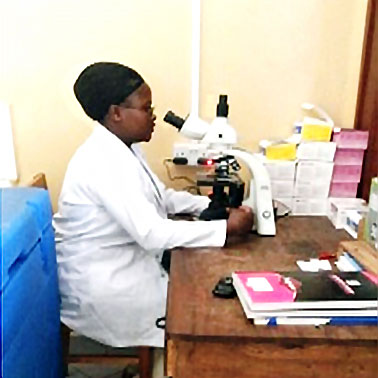Globally, efforts to eliminate malaria are wide ranging, with countless health care professionals and billions of dollars dedicated each year to preventing and treating the disease. Nonethless, Surubu Dispensary was struggling to get by. Identified as one of the poorest performing facilities in the Tarime district of Tanzania’s Lake Zone, the dispensary lacked even the most basic of resources. Furniture was so scarce that employees either brought their own from home or created makeshift workspaces out of boxes. This took a toll on the quality of care: without a well-equipped workplace, lab technicians were often unable to correctly diagnose malaria and other diseases. At times, there seemed to be no solution in sight.
Surubu Dispensary is not alone. While malaria accounts for a staggering 40 percent of all outpatient visits in Tanzania, the local health facilities that serve as the first line of defense against this deadly disease often face staff shortages and weak supply chains. To help address these gaps, MalariaCare, with funding from the U.S. President’s Malaria Initiative, trains supervisory staff from Tanzania’s National Malaria Control Program on providing outreach training and supportive supervision to facilities around the country. This enables supervisors to work face to face with facility staff to identify challenges and develop solutions during their visits to the field.

Improved performance on malaria testing before treatment at Surubu Dispensary, Tanzania. Photo credit: MalariaCare/Tanzania
The arrival of a supportive supervision team marked a turning point for Surubu Dispensary. After observing the lack of basic equipment and the difficulties lab technicians faced in performing malaria rapid diagnostic tests, supervisors worked with staff to develop an action plan to identify and address gaps prior to their next visit. The action plan was shared with the district’s health management team and district medical officer, who in turn vowed to help the facility acquire the furniture and supplies it desperately needed.
When the newly trained supervisors returned to Surubu a few months later, they found the dispensary heading in a promising new direction. After just two rounds of supportive supervision, the facility was showing progress. Laboratory technicians were working comfortably at their newly furnished work stations, while the accuracy of malaria tests and the quality of services provided to patients were improving. At long last, things were looking up for the clinic, its staff, and its patients.
This story was taken from www.malariacare.org.

